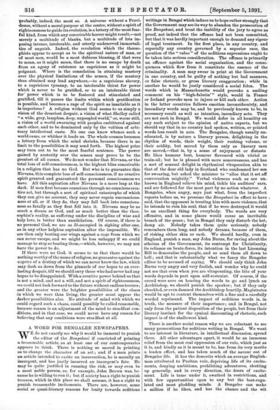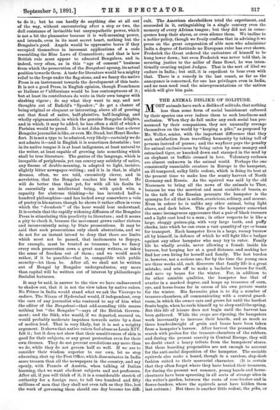A WORD FOR BENGALEE NEWSPAPERS.
WE do not exactly see why it would be immoral to punish the editor of the Bangabasi if convicted of printing a treasonable article, as at least one of our contemporaries appears to think. There is nothing so sacred in printing as to change the character of an act ; and if a man prints an article intended to excite an insurrection, he is morally an insurgent, and has justly incurred an insurgent's fate. He may be quite justified in running the risk, or may even be a most noble person, as, for example, John Brown was, be- cause he is willing to run it; but if society has a right to punish treason, which in this place we shall assume, it has a right to punish treasonable incitements. There are, however, some social or quasi-literary reasons for lenity towards seditious
writings in Bengal which induce us to hope rather strongly that the Government may see its way to abandon the prosecution of
the Bangabasi, and treat the inability of the jury to agree as
proof, not indeed that the offence had not been committed, but that it was hardly important enough to demand any rigour
of legal treatment. In the first place, in any country, and especially any country governed by a superior race, the question of the " value" of the seditious expressions ought to be taken into serious consideration. The offence is primarily an offence against the social organisation, and the conse- quences which flow from it constitute the essence of the criminality. A man may swear in print at the Government in one country, and be guilty of nothing but bad manners, or false rhetoric, or gross literary exaggeration; while in another he would be justly considered a social felon. The words which in Massachusetts would provoke a smiling comment on his " high-falutin' " style, would in France or Ireland provoke men to injure or kill each other. Action in the latter countries follows emotion inconsiderately, and incendiary words may be, and be previously known to be, in necessary result as well as intention, incendiary acts. They are not such in Bengal. We would defer in all humility on any such subject to the opinion of native experts, but we should say that in no country had spoken, written, or printed words less result in acts. The Bengalee, though usually un, educated, is by nature a literary person, delighting in the rhythm of words, their weight, their rushing volume, or their acidity, but moved by them only as literary men are moved,—that is, by a sense of enjoyment or distaste He likes humour best, humour flavoured with vitriol or train-oil; but he is pleased with mere sonorousness, and has a sort of sensual delight in rhythmical vituperation akin to that of the dear old lady in Scotland who condemned her son for swearing, but asked the minister to " alloo that it set aff conversation mightily." Verbal violences such as are un- known in England relieve his mind, tickle his auditors' ears, and are followed for the most part by no action whatever. A Bengalee, when angry, says just what, from the imperfect reports before us, we presume the Bangabasi in effect to have said, that the opponent is treating him with mere violence, that he intends to rain his soul, that if he were destroyed it would be an excellent thing for everybody. The words are very offensive, and in some places would cause an inevitable breach of the peace ; but in Bengal they only disturb the hot, damp air. Nobody takes them quite seriously, nobody remembers them long, and nobody dreams, because of them, of risking either skin or cash. We should hardly, even in England, punish a man, say John Burns, for raving about the atheism of the Government, its contempt for Christianity, its reliance on brute-force, its intention in the last Licensing Bill to demoralise the people, and so send them all down to hell ; and that is substantially what we fancy the Bengalee editor to be accused of saying. We should only think John Burns very angry and very foolish, and wonder why he could not see that even when you are vituperating, the bite of your words depends in part upon self-restraint. Of course, if the crowd were sure on hearing the words to go and lynch an Archbishop, we should punish the speaker; but if they only chuckled, or even damned the Archbishop heartily, Magistrates would be apt to content themselves with a fine and a carefully worded reprimand. The impact of seditious words is, in truth, the measure of their importance; and in Bengal, not only from the patient disposition of the people, but from their literary instinct for the cynical discounting of rhetoric, such impact is of the shallowest kind.
There is another social reason why we are reluctant to see many prosecutions for seditious writing in Bengal. We want to see interest in literature, in intellectual discussion, spread there. All other advantages apart, it would be an immense relief from the most real oppression of our rule, which just as it is, and kindly as it is meant to be, has from its very merits a leaden effect, and has taken much of the savour out of Bengalee life. It has the demerits which an average English- man attributed to Puritan rule, depriving life of its excite- ments, denying ambitions, prohibiting adventures, shutting up generally, and in every direction, the doors of excite- ment. Life is tame under it, swathed in restrictions, and with few opportunitiei open to any but the best-regu- lated and most plodding minds. A Bengalee can make a million if he likes, and has the chance and the wit to do it ; but he can hardly do anything else at all out of the way, without encountering after a step or two, the dull resistance of invincible but unsympathetic power, which is not a bit the pleasanter because it is well-meaning power, and intends, even in its most secret heart, nothing but the Bengalee's good. Angels would be oppressive bores if they -occupied themselves in incessant applications of a. code wesembling the Blue Laws of Connecticut; and that is how British rule must appear to educated Bengalees, and is, indeed, very often, as in this "age of consent" business +from which the prosecution of the Bangabasi sprang, its actual position towards them. A taste for literature would be a mighty relief to the frogs under the flag-stone, and we fancy the native Press is an instrument towards the development of this taste. It is not a good Press, in English opinion, though Frenchmen or Italians or Californians would be less contemptuous of it ; but at least its contributors do write in their own tongue with slashing vigour ; do say what they want to say, and not thoughts out of Enfield's " Speaker ;" do get a chance of being original or eloquent or interesting, above all of pouring -out that flood of satire, half-plaintive, half-laughing, and wholly epigrammatic, in which the genuine Bengalee delights, and in which, it may be added, he has often a skill of which a Parisian would be proud. It is not John Delane that a clever Bengalee journalist is like, or even Mr. Stead, but Henri Roche- fort. It is not a type to be admired, very likely—certainly we do not admire it—and in English it is sometimes detestable ; but in its native tongue it is at least indigenous, at least natural to the writer, at least capable of growing into something which shall be true literature. The genius of the language, which is incapable of periphrasis, yet can convey any subtlety of satire, any finesse of double-meaning, is adapted to light, incisive, slightly bitter newspaper-writing ; and it is in that, in slight dramas, often, we are told, excessively clever, and in novelettes, that the Bengalee reaches his best level. He will do better than that yet, for with all his faults he is essentially an intellectual being, with quick wits, a capacity for abstruse thinking—he has invented half-a- hundred philosophies—and has locked away somewhere a vein of poetry in his nature, though he shows it rather often in verse which the " decadents" of the hour would best understand. It is certain that the rapidly widening diffusion of the Bengalee Press is stimulating this proclivity to literature ; and it seems a pity to check it, because the movement grows rather riotous and inconveniently noisy, by State prosecutions. It may be said that such prosecutions only check aberrations, and we do not for an instant intend to deny that there are limits which must not be passed, that incitements to Sepoys, for example, must be treated as treasons ; but we fancy .every such prosecution cows a great many writers, or takes the sense of freedom out of them ; and we would much rather, if it be possible—that is, compatible with public security—let them be. After all, we shall not be written out of Bengal by Bengalee undergraduates, any more than capital will be written out of interest by philanthropic Socialist lecturers.
It may be said, in answer to the view we have endeavoured to shadow out, that it is not the view taken by native rulers. No Prince in India would stand what we ask the Viceroys to endure. The Nizam of Hyderabad would, if independent, crop the ears of any journalist who ventured to say of him what the editor of the Bangabasi—that odd-sounding title means nothing but "the Bengalee "—says of the British Govern- ment; and the Sikh, who would, if we departed, succeed us, would probably moderate impulses towards satire by a dose of molten lead. That is very likely, but it is not a weighty argument. It shows that native rulers feel abuse as Louis XIV. felt it; but it does not show that their sensitiveness of akin is good for their subjects, or any great protection even for their -own thrones. They do not prevent revolutions any more than we do, while they do not govern half so well. If we are to consider their wisdom superior to our own, let us stop educating, shut up the Post Office, which disseminates in India more treason than all the newspapers in the country, and say openly, with Francis of Austria, when talking of Italian learning, that we want obedient subjects and not professors. After all, if you will think of it, it is a considerable stretch of -authority for a foreign race, to tell two hundred and fifty millions of men that they shall not even talk as they like, lest the work of governing them should one day become too diffi-
cult. The American slaveholders tried the experiment, and succeeded in it, extinguishing in a single century even the memory of every African tongue; but they did not in conse- quence keep their slaves, or even silence them. We incline to a nobler policy, though we freely confess that in advising it we press on the great corporation of able men who administer India a degree of fortitude no European ruler has ever shown. Frederick the Great ordered the caricature of himself to be hung lower down; but even Frederick was never told that, in securing justice to the miller of Sans Souci, he was inten- tionally creating unjust Judges. That is the sort of libel we endure in India ; but still, it is expedient to bear even with that. There is a remedy in the last resort., so far as the annoyance is concerned, for one has privileges even in India, and no man need read the misrepresentations or the satires which will give him pain.



































 Previous page
Previous page